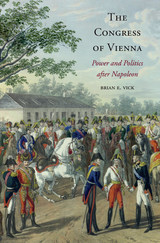
Convened following Napoleon’s defeat in 1814, the Congress of Vienna is remembered as much for the pageantry of the royals and elites who gathered there as for the landmark diplomatic agreements they brokered. Historians have nevertheless generally dismissed these spectacular festivities as window dressing when compared with the serious, behind-the-scenes maneuverings of sovereigns and statesmen. Brian Vick finds this conventional view shortsighted, seeing these instead as two interconnected dimensions of politics. Examining them together yields a more complete picture of how one of the most important diplomatic summits in history managed to redraw the map of Europe and the international system of the nineteenth and twentieth centuries.
The Congress of Vienna investigates the Vienna Congress within a broad framework of influence networks that included unofficial opinion-shapers of all kinds, both men and women: artists and composers, entrepreneurs and writers, hosts and attendees of fashionable salons. In addition to high-profile negotiation and diplomatic wrangling over the post-Napoleonic fates of Germany, Italy, and Poland, Vick brings into focus other understudied yet significant issues: the African slave trade, Jewish rights, and relations with Islamic powers such as the Ottoman Empire and Barbary Corsairs. Challenging the usual portrayal of a reactionary Congress obsessed with rolling back Napoleon’s liberal reforms, Vick demonstrates that the Congress’s promotion of limited constitutionalism, respect for religious and nationality rights, and humanitarian interventions was influenced as much by liberal currents as by conservative ones.

In a unique blend of political, intellectual, and cultural history, Brian Vick explores the world of German nationalism during the first half of the nineteenth century. Vick first presents an original investigation of German conceptions of nationhood in these decades before moving on to analyze the efforts of deputies at the Frankfurt Constituent National Assembly to construct a German national state based on the ethnically diverse German Confederation. He examines debates over fundamental issues that included citizenship qualifications, minority linguistic rights, Jewish emancipation, and territorial disputes, and offers valuable insights into nineteenth-century liberal opinion on the Jewish Question, language policy, and ideas of race.
Contrary to the often invoked dichotomy between cultural and political types of nationalism, in which the German case is usually seen as prototypical of the xenophobic, exclusionary cultural form, this study reveals how German nationalists at Frankfurt interwove cultural and political strands of the national ideal so finely as to sanction equal citizenship status in the proposed state for both the German-Jewish minority and the non-German-speaking nationalities within its boundaries. Yet deputies also contentiously defined Germany's borders so as to incorporate the latter, often unwilling groups, thereby hoping to dominate them both culturally and politically. Conflict was thus as much a part of this "culture of nationhood" as inclusion.
READERS
Browse our collection.
PUBLISHERS
See BiblioVault's publisher services.
STUDENT SERVICES
Files for college accessibility offices.
UChicago Accessibility Resources
home | accessibility | search | about | contact us
BiblioVault ® 2001 - 2024
The University of Chicago Press









